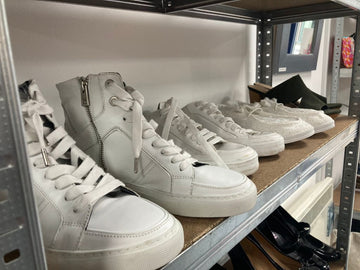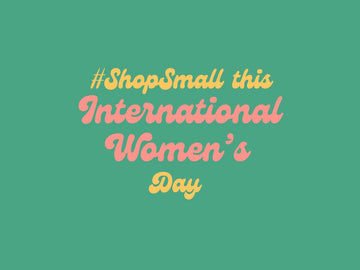Meet Maveen Pereira, Director of Programmes at Traidcraft Exchange
Traidcraft is the reason we (Helen and Andy) moved to the North East 25 years ago and we've known Maveen Pereira many years. I was so impressed with the work Traidcraft Exchange is currently doing around calling for a Fashion Watchdog that I thought it was high time for us to catch up with Maveen in particular to find out more about the valuable work of Traidcraft Exchange.

How and when did you come to work for Traidcraft Exchange?
I have been working with Traidcraft Exchange since March 2004. I was working in India at the time. However, we have a son who was diagnosed with Autism and were struggling with the dearth of local services. So I started looking for jobs and applied to Traidcraft Exchange when I saw a role having been advertised. The rest is history.
What is the role of Traidcraft Exchange?
Traidcraft Exchange brings people together to find injustice in trade. We believe in the power of trade to change lives and create lasting solutions to poverty. But we think the way the majority of trade happens in the world today is fundamentally flawed, making rich people richer and exploiting people living in poverty. We work to change this by working with farmers and workers in South Asia and East Africa helping people living in poverty to get a fair share of the benefits of trade. We also bring change through advocacy and campaigning in the UK to change the rule of international trade. We are the partner charity of Traidcraft, the fair-trade company. We are currently on a transformational journey to shift decision-making to farmers and workers most affected by trade and climate injustice and are committed to accompanying them to achieve their own vision.

What is your role at Traidcraft Exchange?
My role is Director of Programmes, which involved supporting all our international teams to achieve our mission.
How has the pandemic affected your role at Traidcraft Exchange?
The pandemic has not affected my role itself but has affected our ability to work with communities due to lockdowns and travel restrictions in the countries where we work.
How has the pandemic affected the lives of your business development partners and producers overseas?
Farmers and workers have been severely affected by the pandemic through loss of work, loss of markets and loss of income. Inability to protect communities against the virus has put these communities at risk of starvation, as well as the inability to isolate to protect themselves from the virus. Moreover, due to the dearth of social protection measures in the country, these communities have had to face a huge amount of hardship. This is particularly true for migrant workers, agricultural workers and workers in textiles/construction supply chains, including homeworkers – all currently out of work. Many companies cancelled orders, stopped shipment of goods, and consequently employers did not pay them. Fear of the virus, lack of supply at the place of employment therefore forced 1000s of migrant workers to walk 100s of miles to their villages – without any support – except due to the goodwill of generous citizens. Recovery will take a long time, considering that these countries are still reeling under the impact of the pandemic.

Finally, how did Traidcraft Exchange’s involvement in campaigning for a Fashion Watchdog come about?
This is not my area so I asked Fiona Gooch, Senior Private Sector Advisor at Traidcraft Exchange, and she came back with this response.
Traidcraft Exchange has worked for more than a decade trying to improve the working conditions of workers in garment supply chains. We have brought out guidance on how retailers and brands can buy responsibly from their suppliers, in a manner that enables and encourages good working conditions for workers.
Since launching the Material Concerns responsible purchasing guide in 2008, many other organisations such as International Labour Organisation, Ethical Trading Initiative and Human Rights Watch have also continued to share about how abusive purchasing practices continue to drive poor working conditions.
Meanwhile we were also working to improve the purchasing practices of the food sector. Traidcraft Exchange campaigned for the Groceries Code Adjudicator which acts as a Supermarket watchdog and have been pleased at the progress that the two people who have worked as an adjudicator so far have made in reducing abusive purchasing practices. We now know that a regulator can be effective at curbing abusive purchasing practices of powerful retailers.
In 2020, we were in touch with garment suppliers and workers organisations who told us of the human misery caused when suppliers failed to pay their workers, directly as a consequence of retailers and brands’ actions in relation to forcing suppliers to accept lower prices, delayed payment terms, not paying for products already made & shipped, cancelling orders and a range of other actions breaching their contracts. So Traidcraft Exchange launched a campaign in April 2020 asking the 10 largest brands to disclose if they were honouring their contracts and what they were doing in relation to safeguarding workers’ rights. Although 16,000 campaigners contacted retailers and other campaign groups also pushed the brands and retailers to improve, the improvements the brands and retailers made were small. This confirmed that pressure on retailers and brands on how they treat their suppliers, which is a key element that shapes their profit margin, to voluntarily improve does not work.
This led Traidcraft Exchange to call for a Fashion Watchdog, which might be more formally known as a Garment Trading Adjudicator, to play a similar role to the Supermarket Watchdog in relation to stopping the abusive purchasing practices of clothing brands and retailers.
Thanks, Fiona and back to Maveen!
Maveen, how has working at Traidcraft Exchange affected your values and lifestyle?
Traidcraft Exchange exposed me to the benefit of ethical and fair trade and I try where possible to walk the talk. Besides, having directly interacted with vulnerable communities of farmers and workers, I can see first-hand the benefits of them getting a fair return, so it's really important for consumers like myself to think before I buy. In the last few years, the plight of communities who are affected by climate change has come to the fore and the fact that those who bear the brunt of natural disasters are those who are least responsible for the changes. Hence Climate Justice has now begun to affect my life and lifestyle. I have tried to reduce the use of plastic in our household, buy second hand where possible, and get away from a ‘throw away’ mentality. This is extremely hard, and the pandemic has affected my behaviour in a negative way with more use of plastic, which I am trying to control and avoid. However, we have made efforts to buy local, to buy from small businesses, reduce use of exotic produce that come from overseas, and buy from shops that offer refills like Nil Living in Grainger Market.
How far has the world come in developing fair purchasing practices and better working conditions for producers and partners across the world?
It is clear that the world has not made much progress on developing fair purchasing practices and better working conditions for farmers and workers across the world. The pandemic has demonstrated how precarious these relationships are and the low level of commitment on the part of international companies to consider their suppliers as partners. As soon as the pandemic started many international brands dumped their suppliers with little consideration to their commitment to the workers and producers. There was no warning and no negotiation. It is easy to use the clause of ‘Force Majeure’ to cancel orders, stop payments and put suppliers into losses amounting to millions of dollars and this then led to a ripple effect for suppliers who suddenly had no cash flow and did not see their responsibility to their workers. The last 15 months have been a nightmare for producer and worker rights. Millions of people have gone back into poverty. The worst affected have been women, ethnic communities and migrant workers who have no assets to fall back on. I find it hard to accept that the billionaires of this world are willing to invest in space travel just for pleasure when that money could have made such a massive difference to the starving millions in our world. The climate emergency needs to be seen as an ‘emergency’ and not fancy rhetoric! So the world has definitely not become a better place!
So what else needs to happen and change to make the world a better place?
Governments need to wake up and take control on behalf of the most vulnerable. There was a time when voluntary standards were the norm. I do not think we can continue to depend on voluntary behaviour change. We need legal protection, companies need to be held responsible for their irresponsible behaviour, governments too need to be held to account for their decisions (which are more political / feeding on popular votes), and we as citizens need to wake up and use our powers to change how business and governments operate. We can see the people’s uprising more in the last 10 years, but more needs to happen.

What is one thing we as individuals can do today?
We as individuals need to take responsibility to act in whatever way possible, every small act will help – don’t buy from supermarkets who have unfair deals with their suppliers, buy from and promote local and small businesses, stop buying brands where possible, and buy from shops where you can use your own containers. Write to your political representatives when important decisions are being made by the government and write to companies to ask for products that are fair and sustainable. Think climate, fair, and local before every purchase.
Thanks, Maveen, it's great to get a glimpse into how your role at Traidcraft Exchange has affected your own life, as well as the lives of the producers and partners you work with.
And then there's the campaign for a Fashion Watchdog which we at Green Heart Collective fully support.
As soon as you've finished reading this blog, please sign the petition to the Ministers at the Department for Business to show how many consumers would like to be able to shop with a clear conscience without giving money to retailers and brands who have unethical, sometimes unlawful purchasing practices.
The campaign petition page can be reached from here: https://traidcraftexchange.org/fashion-watchdog, & then click “Take Action”.






1 comment
It is shocking to see these hard working women living in poverty not being paid fairly